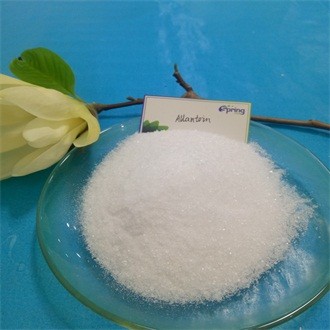Allantoin, a natural compound found in plants and animals, has gained attention for its potential applications in agriculture. Its feasibility as an agricultural product lies in its ability to promote crop yield through various mechanisms.
Firstly, allantoin acts as a natural biostimulant, enhancing plant growth and development. It stimulates cell division and elongation, leading to increased root and shoot growth. This promotes stronger and healthier plants, which are better equipped to absorb nutrients and water from the soil. Additionally, allantoin improves nutrient uptake efficiency by enhancing the activity of root-associated enzymes responsible for nutrient absorption, such as phosphatases and nitrate reductases.
Secondly, allantoin aids in stress tolerance and protection against environmental challenges. It acts as an osmolyte, regulating water balance within plant cells and minimizing water loss during drought conditions. This helps plants maintain turgidity and overall physiological function even under water-deficient conditions. Allantoin also acts as an antioxidant, scavenging harmful free radicals and protecting plants against oxidative stress caused by factors like UV radiation and pollution.
Furthermore, allantoin plays a role in nutrient recycling and nitrogen metabolism. It is involved in the breakdown of uric acid, a nitrogenous waste product, into allantoin. This conversion allows plants to utilize nitrogen more efficiently, reducing the need for external nitrogen inputs. By enhancing nitrogen metabolism, allantoin contributes to improved plant growth, chlorophyll synthesis, and protein production.
Moreover, allantoin has been found to promote beneficial interactions between plants and beneficial microorganisms in the soil. It acts as a chemoattractant for beneficial soil bacteria, promoting their colonization around plant roots. These bacteria can facilitate nutrient acquisition, fix atmospheric nitrogen, and protect plants from pathogens. The symbiotic relationship between plants and beneficial soil microorganisms enhanced by allantoin can lead to improved crop health and productivity.
In conclusion, the application of allantoin in agriculture holds significant promise for promoting crop yield. Its biostimulant properties, stress tolerance enhancement, involvement in nutrient recycling, and facilitation of beneficial microorganisms all contribute to improved plant growth, development, and overall productivity. Further research and field trials are essential to determine optimal application methods, dosage, and specific crop responses, but allantoin shows great potential as a valuable tool in sustainable agriculture.
Post time: May-26-2023


